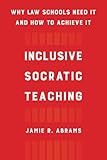Inclusive Socratic teaching : why law schools need it and how to achieve it / Jamie R. Abrams.
Material type: TextLanguage: English Publication details: Oakland : University of California Press, 2024.Description: xiv, 247 p. : ill. ; 23 cmISBN:
TextLanguage: English Publication details: Oakland : University of California Press, 2024.Description: xiv, 247 p. : ill. ; 23 cmISBN: - 9780520390720
- 340.071/173 23/eng/20231012
- KF272 .A27 2024
| Item type | Current library | Collection | Shelving location | Call number | Copy number | Status | Date due | Barcode | |
|---|---|---|---|---|---|---|---|---|---|
 Books
Books
|
North South University Library | Non-fiction | General Stacks | KF272.A27 2024 (Browse shelf(Opens below)) | 1 | Available | 49163 |
Includes bibliographical references and index.
The centrality of the Socratic classroom to legal education's curricular core despite its harms and limits -- Sustained calls for curricular reforms from critical perspectives -- The state of our students suggests we should not fear change in the curricular core -- Symbiotic struggles in the profession further reinforce reforms -- The imperative of Inclusive Socratic classrooms -- Pivoting away from problematic Socratic performances -- Identifying shared values shaping Socratic classrooms -- Measuring effective, inclusive, and equitable Socratic classrooms.
"For more than fifty years, scholars have documented and critiqued the marginalizing effects of the Socratic teaching techniques that dominate law school classrooms. In spite of this, law school budgets, staffing models, and course requirements still center Socratic classrooms as the curricular core of legal education. In this clear-eyed book, law professor Jamie R. Abrams catalogs both the harms of the Socratic method and the deteriorating well-being of modern law students and lawyers, concluding that there is nothing to lose and so much to gain by reimagining Socratic teaching. Recognizing that these traditional classrooms are still necessary sites to fortify and catalyze other innovations and values in legal education, Inclusive Socratic Teaching provides concrete tips and strategies to dismantle the autocratic power and inequality that so often characterize these classrooms. A galvanizing call to action, this hands-on guide equips educators and administrators with an inclusive teaching model that reframes the Socratic classroom around student-centered, skills-centered, client-centered, and community-centered teaching techniques"--
Law
Sumaiya Kainat Bintey Kohinoor
There are no comments on this title.
 North South University Library OPAC
North South University Library OPAC